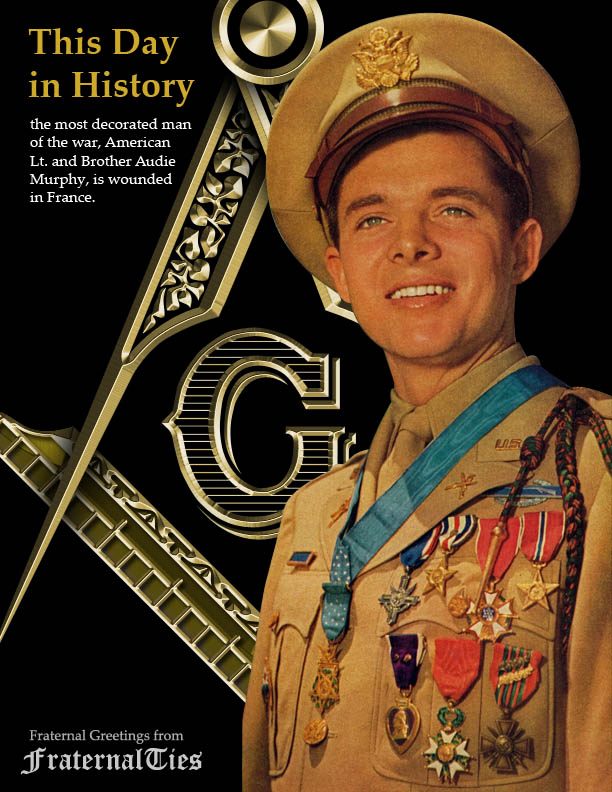En: Audie Murphy: Unterschied zwischen den Versionen
Keine Bearbeitungszusammenfassung |
Keine Bearbeitungszusammenfassung |
||
| Zeile 1: | Zeile 1: | ||
[[Datei:554297 10151389440511998 1795164392 n.jpg]] | [[Datei:554297 10151389440511998 1795164392 n.jpg]] | ||
== Audie Murphy == | == Audie Murphy == | ||
Source: Fraternal Ties http://www.history.com/this-day-in-history/audie-murphy-wounded | |||
Source: Fraternal Ties | |||
| Zeile 17: | Zeile 15: | ||
Upon returning to the States, Murphy was invited to Hollywood by Jimmy Cagney, who saw the war hero's picture on the cover of Life magazine. By 1950, Murphy won an acting contract with Universal Pictures. In his most famous role, he played himself in the monumentally successful To Hell and Back. | Upon returning to the States, Murphy was invited to Hollywood by Jimmy Cagney, who saw the war hero's picture on the cover of Life magazine. By 1950, Murphy won an acting contract with Universal Pictures. In his most famous role, he played himself in the monumentally successful To Hell and Back. | ||
{{SORTIERUNG:Morphy}} | |||
[[Kategorie:Personalities]] | |||
Version vom 8. Februar 2013, 23:23 Uhr
Audie Murphy
Source: Fraternal Ties http://www.history.com/this-day-in-history/audie-murphy-wounded
This day in history, the most decorated man of the war, American Lt. and Brother Audie Murphy, is wounded in France. (He was a member of North Hollywood Lodge No. 542)
Born the son of Texas sharecroppers on June 20, 1924, Murphy served three years of active duty, beginning as a private, rising to the rank of staff sergeant, and finally winning a battlefield commission to 2nd lieutenant. He was wounded three times, fought in nine major campaigns across Europe, and was credited with killing 241 Germans. He won 37 medals and decorations, including the Distinguished Service Cross, the Silver Star (with oak leaf cluster), the Legion of Merit, and the Croix de Guerre (with palm).
The battle that won Murphy the Medal of Honor, and which ended his active duty, occurred during the last stages of the Allied victory over the Germans in France. Murphy
acted as cover for infantrymen during a last desperate German tank attack. Climbing atop an abandoned U.S. tank destroyer, he took control of its .50-caliber machine gun and killed 50 Germans, stopping the advance but suffering a leg wound in the process.
Upon returning to the States, Murphy was invited to Hollywood by Jimmy Cagney, who saw the war hero's picture on the cover of Life magazine. By 1950, Murphy won an acting contract with Universal Pictures. In his most famous role, he played himself in the monumentally successful To Hell and Back.

